Free home visits
with a local audiologist

Head of Online Medical Content

Audiology Expert at Hearing Aid UK
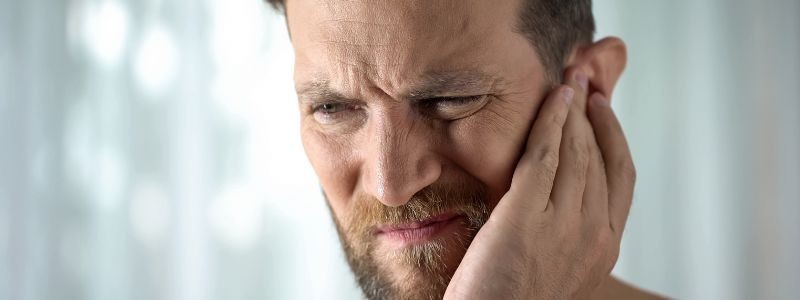
What to do about itchy inner ears | What causes itchy ears? | How to stop itching ears at home? | Treatment for itchy ears | Preventing itchy ears | Conclusion
Itchy ears can result from various factors, including allergies, earwax buildup, or skin conditions like eczema. Scratching can worsen irritation and potentially lead to infection. Gentle cleaning with a damp cloth or using over-the-counter ear drops can provide relief, but persistent itching warrants medical evaluation.
In this article, we focus on the other causes of itchy ears, treatment for itchy ears, and how you can prevent ear itching in the future.
It is common for most people to get some form of itchy ears. No matter what age, dry itchy ears are irritating - especially when scratching the affected area causes no relief and probably does more harm than good.
You may have itchy ears at night, hot itchy outer ears, or itchy painful ears - either way, they need to be looked at and treated. An itchy ear can be a very annoying and uncomfortable sensation.
It is often caused by an inflammation or irritation of the skin inside the ear canal, but it can also be a symptom of a more serious medical condition.
Why does the inside of my ear itch? You may have itchy ears and are constantly having to scratch right inside your ear canal to relieve the annoyance that it brings. You've heard the bygone tales of itchy ears being due to someone gossiping about you, this is something entirely different.
Irritated, itchy ears develop for several reasons; however, the chances are it is due to how the sensitive skin in or around your ear is coping in your environment.
The warmer the environment outside the ear, the environment in the inner ear faces various challenges, as moisture and warmth increase the risk of infection by bacteria.
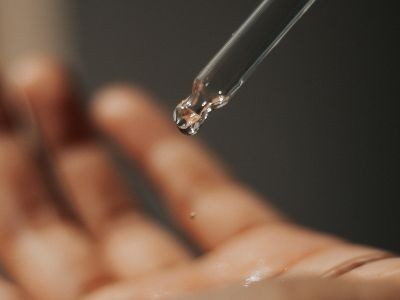
Itchy ears might be a feeling of irritation or tickling, alongside the constant need to scratch the area. The said area might be red and inflamed or even desquamation, which is when your outer layer of skin begins to replace itself if it is linked to eczema.
Whatever the cause, continuous itching within the ear is not a normal condition, as healthy ears generally do not itch.
That's why it is important to seek medical help to find the root of the problem if you continue to have itchy ears over a long duration. Confirmation of where the itchiness is will help diagnose the cause.
For instance, the ear itches inside and feels like an itchy inner ear, it itches inside but doesn't appear to be deep inside and feels more like itchy ear canals. Or perhaps you might have an itchy auricle/pinna (outer ear) if your ears itch on the outside only.
What does it mean if your ear itches? You may have itchy outer ears (called the pinna) or an itchy inner ear, which may itch deep inside your canal - both are still referred to as the outer ear. Whatever part of the ear itches, it can leave you feeling simply fed up if the irritation continues.
From experience, it is highly likely that the itching is due to dermatitis, and however mild it might be - you must always visit your local GP and get your itchy ears checked out.
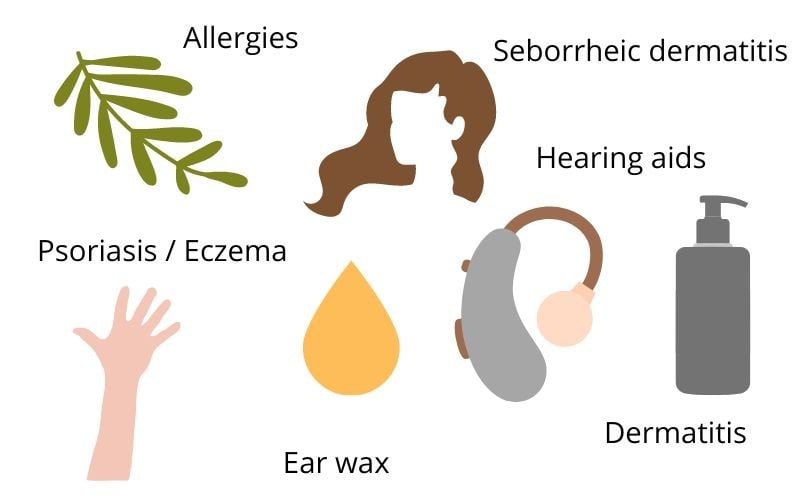
Below are the main reasons why your ears might itch, itchy ear remedies, and what to do about it:

Earbuds can irritate the ears, itching in the ear canal, cause swelling, or bring on an ear infection, especially if you wear earbuds a lot and for extended periods. In some cases, continuing to wear earbuds that are not clean can cause an outer ear infection (or otitis externa) that is also known as swimmer's ear.
Itchy ears may be a symptom of a middle-ear infection too.
Remedy for irritated ears caused by earbuds: Take regular breaks from wearing your earbuds, keep them clean and your ear free of any wax build-up.
Hearing aid domes and earmolds can cause itchy inner ears if they rub against your skin. Hearing aids can also block your ear canal, which can cause ear wax build-up. In some rare cases, people can be allergic to the materials of the domes, earmolds, or other parts of the hearing aid.
Remedy for itchy ears inside whilst wearing hearing aids: Itchy ears shouldn't stop you from wearing your hearing aids, as it is something that can easily be solved. Discuss your problems with your audiologist, as they can take a look at your ears and check that your devices are fitted correctly.
They can also recommend various ointments to relieve dry itchy ears, so your hearing aids will feel more comfortable. Keeping your ears clean will also help, as it can avoid excess ear wax build-up. Your audiologist can also talk about how to support your ear health and hygiene going forward.
Seborrheic dermatitis is generally the most common cause of itchy ears. This is a skin rash that affects your sebaceous glands that produce oil. It can appear on your eyebrows, scalp, and ears.
It can cause your skin to flake on your scalp, which is commonly called dandruff. Severe cases will result in your skin being red, sore, and intensely itchy.
There is also a problem with being 'too clean'! For example, if you are constantly cleaning your skin and using various skin care products there is a chance you can break down the protective layer of your skin that is healthy. This results in itching.
Remedy for dry itchy ears: Book an appointment with your GP and they will decide the best course of action and treatment. If you have dandruff, switch your shampoo and conditioner to a dandruff product or one that is kinder to your skin like some of the organic brands available.
At-home remedies like olive oil and aloe vera can help restore the natural pH of your ear. Some numbing creams can reduce the symptoms of itching like capsaicin creams.
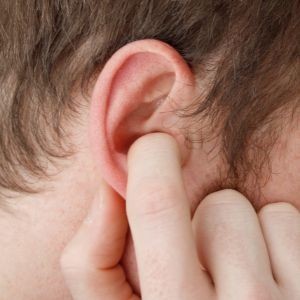
There are many symptoms of the over-accumulation of ear wax and ear wax build-up. You may experience some or all of the common symptoms, but it is crucial not to self-diagnose. Only your GP will be able to give you a correct verdict. Symptoms include hearing loss, earache, ear infections, dizziness, and itchy ears.
Remedy for an itch inside ears due to earwax build-up: Try using home treatments that you can get from your local pharmacy, such as ear drops. However, if you don’t see results after a week you need to find a local audiologist, as they might put you on a course of steroid ointment or cream to treat the itch. Click here to read about how to clean your ears safely.
Avoid using cotton swabs, as these can push your earwax further into your ear canal. scratch your skin, puncture the eardrum, or cause infection. Audiologists typically have the ability and equipment needed to safely remove excess ear wax. On a side note, make sure to see your GP if you have sudden hearing loss or pain.
Firstly, avoid putting anything into your ears to try and relieve your ear from itching, as you can increase your chances of damaging your eardrum and making the inner ear skin worse. Unfortunately, this also makes the urge to itch even greater.
If your ear canal is inflamed, you may experience an allergic skin reaction in the ear. This might be a reaction to a new hairspray, shampoo or conditioner. If you suffer from seasonal allergies, like hay fever, and itching you can find antihistamines from your local pharmacy that can alleviate your symptoms.
However, if you see any discharge from your ear or experience hearing loss, pain, or fever - contact your doctor as soon as possible.
Can you prevent itchy ears? Stopping putting things in your ear is a good start, such as cotton swabs which can push earwax further into your ear canal or remove the protective layer of wax in your ear. This can lead to more discomfort.
Always remember to dry your ears thoroughly every time you get them wet, either in the bath, shower, sea, or pool. This reduces the risk of trapped moisture which can cause infections and bring on itchy ears.
Itch behind ears or ear lobe itching due to jewellery? Jewellery can also cause itchy earlobes, as some people can be sensitive to allergic to certain metals. If you find your jewellery is itching your ears, think about switching the metals.
Two of the main culprits of this are the nickel and cobalt content in costume jewellery. Both are commonly used as a base to coat and plate with silver and gold.
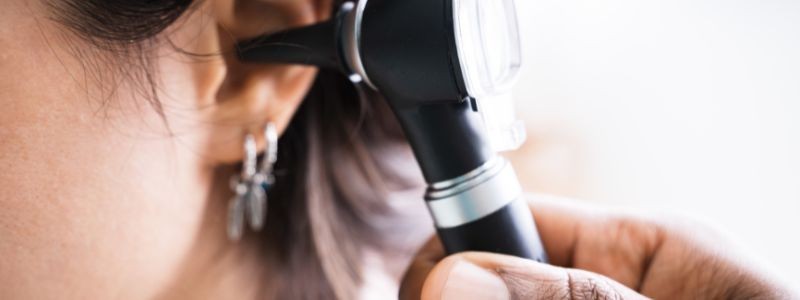
If you are unable to find out the cause of your itchy ears and have tried at-home treatments, experiencing discomfort, swelling, or have any breaking skin - it is vital that you call your GP as soon as possible.
Infections of the ear can be extremely dangerous if left undiagnosed and untreated. If the symptoms are severe, your doctor might send you to your local ENT department for specialised treatment.
There can be extra symptoms of itchy ears that you need to be aware of and look out for in addition. If you are experiencing any of the below symptoms, along with your itchy ears, we recommend that you contact your local GP.
They will go through your health history, examine your ears, and check for earwax build-up (especially near the eardrum) or any inflammation.
Even if you don't have any of the above symptoms and your itchy ears are still causing you discomfort, we would still advise contacting your GP for a hearing health check. This also rules out any nasty surprises.
If you are wearing hearing aids and you think they are the cause of the itching, you don't have a local audiologist and you are not hearing as well as you should - we can help you. If you haven't had your hearing tested for a while, this is something we would recommend first, as naturally, your hearing alters over time.
The hearing aids you are wearing now might not be supporting you the way they did when you first started wearing them. This might mean it is time to check your hearing and upgrade your existing devices.
In general, it is important to be gentle when cleaning or attempting to relieve an itchy ear. Avoid using sharp objects, such as hairpins or bobby pins, to scratch the inside of the ear, as this can cause injury or further irritation.
If the itch persists or is accompanied by other symptoms, such as pain or discharge, it is important to see a healthcare provider for further evaluation and treatment. You can also download the NHS whitepaper on ear health for a useful reference below.
You might need to get your hearing checked. With over 200 private audiologists, we can support you locally.
Call us free and speak to one of our audiologists for free impartial advice about hearing aids and hearing healthcare on 0800 567 7621
 I have difficulty hearing in noisy places
I have difficulty hearing in noisy places  High-Pitched Sounds Like Birdsong Are Fading. Do I Have Hearing Loss?
High-Pitched Sounds Like Birdsong Are Fading. Do I Have Hearing Loss?  Asking people to repeat themselves frequently. Do I have hearing loss?
Asking people to repeat themselves frequently. Do I have hearing loss? Do not spend hundreds of pounds without getting a second opinion from us.
 Not only are the prices great, but the service is fantastic! Many thanks to your team.
Not only are the prices great, but the service is fantastic! Many thanks to your team.If you are looking at this page then it is likely that an audiologist has suggested that you purchase this particular hearing aid, so is this the best model for you?
In general, any audiologist will always recommend to you the model that best suits your needs. Here is a useful checklist to make sure that is the case.
If in doubt, feel free to give us a call. That's what we're here for. In the meantime, read all about our review of the best hearing aids for 2025 here
If you have significant hearing loss in both ears, you should be wearing two hearing aids. Here are the audiological reasons why:
Localisation: The brain decodes information from both ears and compares and contrasts them. By analysing the minuscule time delays as well as the difference in the loudness of each sound reaching the ears, the person is able to accurately locate a sound source. Simply put, if you have better hearing on one side than the other, you can't accurately tell what direction sounds are coming from.
Less amplification is required: A phenomenon known as “binaural summation” means that the hearing aids can be set at a lower and more natural volume setting than if you wore only one hearing aid.
Head shadow effect: High frequencies, the part of your hearing that gives clarity and meaning to speech sounds, cannot bend around your head. Only low frequencies can. Therefore if someone is talking on your unaided side you are likely to hear that they are speaking, but be unable to tell what they have said.
Noise reduction: The brain has its own built-in noise reduction which is only really effective when it is receiving information from both ears. If only one ear is aided, even with the best hearing aid in the world, it will be difficult for you to hear in background noise as your brain is trying to retain all of the sounds (including background noise) rather than filtering it out.
Sound quality: We are designed to hear in stereo. Only hearing from one side sounds a lot less natural to us.
Fancy some further reading on this topic? You can read about why two hearing aids are better than one in our article, hearing aids for both ears, here
For most people, the main benefit of a rechargeable hearing aid is simple convenience. We are used to plugging in our phones and other devices overnight for them to charge up. Here are some other pros and cons:
For anybody with poor dexterity or issues with their fingers, having a rechargeable aid makes a huge difference as normal hearing aid batteries are quite small and some people find them fiddly to change.
One downside is that if you forget to charge your hearing aid, then it is a problem that can't be instantly fixed. For most a 30-minute charge will get you at least two or three hours of hearing, but if you are the type of person who is likely to forget to plug them in regularly then you're probably better off with standard batteries.
Rechargeable aids are also a little bit bigger and are only available in Behind the Ear models.
Finally, just like with a mobile phone, the amount of charge you get on day one is not going to be the same as you get a few years down the line. Be sure to ask what the policy is with the manufacturer warranty when it comes to replacing the battery.
Looking for more information on rechargeable hearing aids? Read our dedicated page on the topic here
For most people, the answer is yes. But it's never that simple.
The majority of hearing problems affect the high frequencies a lot more than the low ones. Therefore open fitting hearing aids sound a lot more natural and ones that block your ears up can make your own voice sound like you are talking with your head in a bucket. Therefore in-ear aids tend to be less natural.
However the true answer is we can't tell until we have had a look in your ears to assess the size of your ear canal, and until we have tested your hearing to see which frequencies are being affected.
People with wider ear canals tend to have more flexibility, also there are open fitting modular CIC hearing aids now that do not block your ears.
There is also the age old rule to consider, that a hearing aid will not help you if it's sat in the drawer gathering dust. If the only hearing aid you would be happy wearing is one that people can't see, then that's what you should get.
Most people can adapt to any type of hearing aid, as long as they know what to expect. Have an honest conversation with your audiologist as to what your needs are.
Generally speaking, six or more. Unless it's none at all.
The number of channels a hearing aid has is often a simplistic way an audiologist will use to explain why one hearing aid is better than another, but channels are complex and it is really not that straightforward. Here are some reasons why:
Hearing aids amplify sounds of different frequencies by different amounts. Most people have lost more high frequencies than low and therefore need more amplification in the high frequencies. The range of sounds you hear are split into frequency bands or channels and the hearing aids are set to provide the right amount of hearing at each frequency level.
Less than six channels and this cannot be done with much accuracy, so six is the magic number. However, a six channel aid is typically very basic with few other features and is suitable only for hearing a single speaker in a quiet room. The number of channels is not what you should be looking at, it's more the rest of the technology that comes with them.
As a final note, different manufacturers have different approaches. One method is not necessarily better than any other. For example, some manufacturers have as many as 64 channels in their top aids. Most tend to have between 17 and 20. One manufacturer has no channels at all.
Hearing aids are easily lost, misplaced or damaged and typically are one of the most expensive personal possessions an individual can own. We offer hearing aid warranty coverage for £80 per year per aid. Find out more about this service we provide here
All our audiologists use the very latest technology and provide the full range of tests to accurately measure your hearing for free. Find out about what hearing healthcare services we offer all our customers here
Hearing Aid UK offers all their customers free home visiting services, even in a care home environment, for no extra cost. Including hearing tests, fittings, maintenance, check-ups and much more in the comfort of your own home and at your convenience. Find out more information about our home visits here
Here, at Hearing Aid UK, we are dedicated to offering low hearing aid prices. We achieve this by having no head office and low marketing costs. Our hearing aid prices are amongst the lowest you will find anywhere in the world. Explore our prices, brands, and models here
When we refer to a product as 'Latest Launch', we mean it is the latest to be released on the market.
When we refer to a product as 'New', we mean that the product is the newest hearing aid model on the market.
When we refer to a product as 'Superseded', we mean that there is a newer range available which replaces and improves on this product.
When we refer to a product as an 'Older Model', we mean that it is has been superseded by at least two more recent hearing aid ranges.